You may remember Vivian from our Staff Spotlight last month.
The outstanding role model is perfectly placed as a coordinator in our Beyond St Jude’s team. Her St Jude’s duties include supporting graduates through their Community Service Year, offering career guidance and assisting with university, loan and scholarship applications.
Vivian has recently returned from the United States where she was presenting on the accomplishments of our school and students to cement St Jude’s participation in the MasterCard Foundation Scholars Program at African Leadership Academy.
The trip was a huge success!
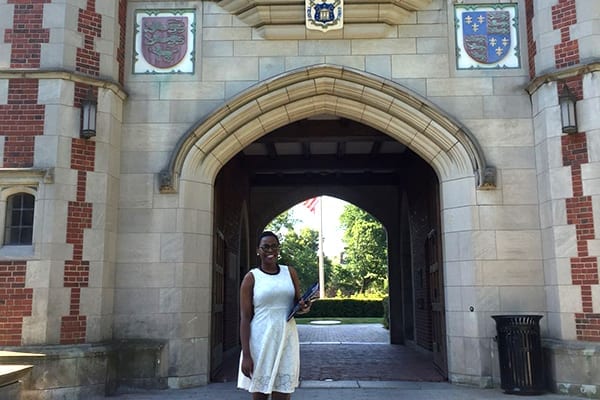
“We are so excited, this partnership opens up a whole world of opportunities for our graduates, quite literally,” Vivian said.
Joining the Program means that, every year, up to five fully funded scholarships are available to our most impressive students at partner universities all over the world!
On her tour de force, Vivian had the chance to visit some of these universities that our graduates will be eligible for as part of the program.
“The universities I visited in the United States were amazing. It took me over an hour and a half to finish a campus tour. I can’t imagine what it will be like for our students to set foot on campuses in Mauritius, Germany, Canada, Kenya or Zimbabwe!”
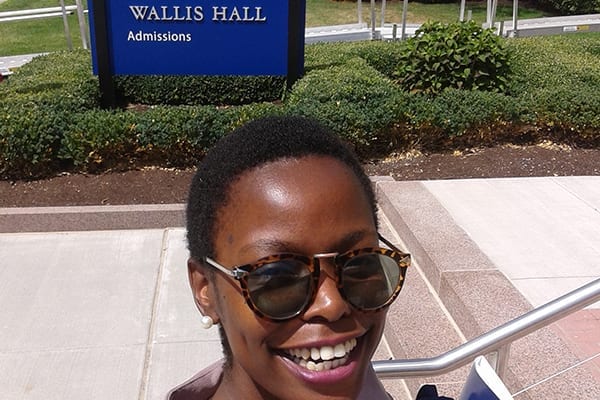
“Did you know, Hillary Clinton went to Wellesley University? I visited there as well as Trinity College and Marist College – beautiful universities. Who knows one of our graduates may be the first female President of Tanzania!”
At all these venues she made connections, shared St Jude’s story and asked a million questions for our students.
“I am so excited for our hardworking applicants; scholars who are accepted into the program will have the full cost of their university education covered; from textbooks, a laptop and a mobile phone, to visas and flights, including trips home for the summer,” Vivian said.
The program also offers ongoing academic, pre-professional and personal support for the participants. This support will continue with professional development from the African Careers Network after graduation from university.
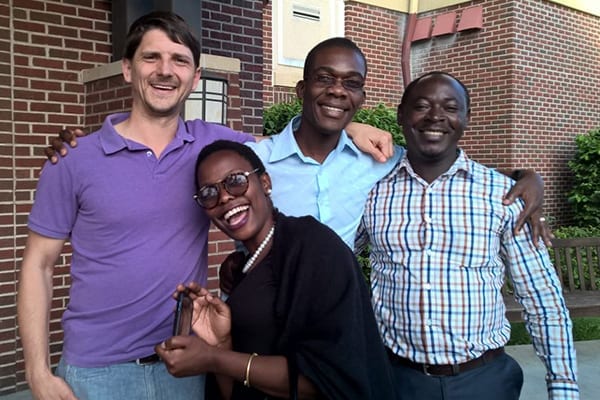
Students who are chosen will have demonstrated academic excellence, strong leadership skills and evidenced the ability to bring their ideas to life.
Like St Jude’s, the MasterCard Foundation Scholars Program at African Leadership Academy believes in supporting the future leaders of Tanzania and Africa.
After graduation, the scholarship students will be required to return to Tanzania and share all that they have learnt at universities around the world with their communities.
We are so excited about this partnership and look forward to all that we know our graduates will achieve, thanks in part to the work of Vivian and the Beyond St Jude’s team!
Help St Jude’s continue to offer its students the best opportunities by donating today.
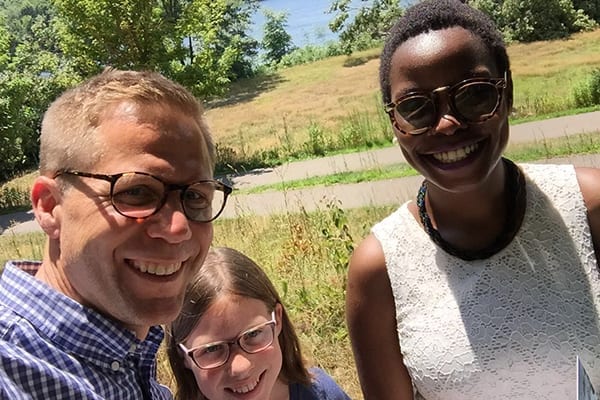
Eunice Mtili was born to teach.
“When I was very young, whenever I would share or explain something, I would give examples and demonstrate, moving my hands, everyone would say, you would make a very good teacher,” Eunice said.
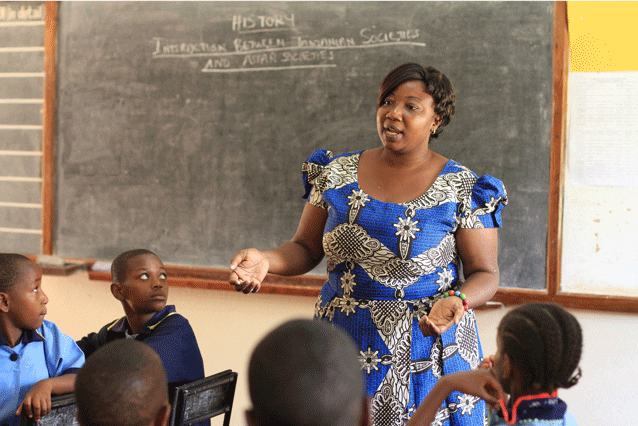
Through the course of a 21-year teaching career, Mrs Mtili has proven everyone right, channeling her natural talent into educating thoughtful and resilient students who love to learn.
“I am really sharp, I know I am very fast, and I want everyone to be fast in my classes, I want smart, cheery, quick, happy people,” she said.
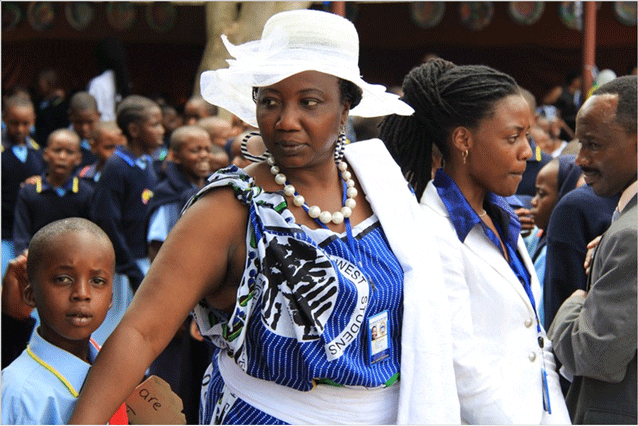
This is an ambitious goal in Tanzania where the government school system is overcrowded and under-resourced. The World Bank reports 23% of government school teachers don’t show up for work on a given day (2012).
St Jude’s offers Eunice the resources and support to be the best teacher she can be.
Since arriving in 2011, Eunice has taken full advantage of the small class sizes and extended curriculum which lends itself to vibrant demonstrations and opportunities to “learn by doing”.
She currently teaches social studies at our primary campus.
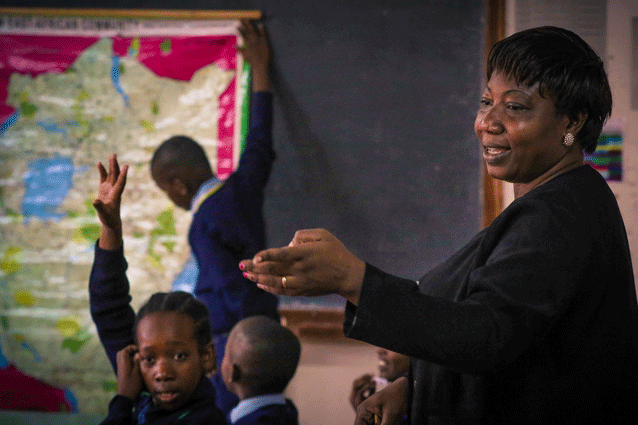
“The first thing I do to introduce social studies is explain to students why I am teaching them these things, social studies is ultimately preparing them to become good leaders.”
“So in geography, I say, how will you become a leader if you don’t know your area, its resources and geographical features?
“In civics, as we expect leaders to conduct development, I say, 'how would you use the features and natural resources of your areas for development?'. We also role play elections and speeches."
“In history, we learn about independence and why we are living like this. So I show them examples of good leaders and the ones who failed.”
Eunice is helping St Jude’s create good leaders and, after five years, she is starting to see the fruits of her labour.
“I have many students at St Jude’s who come back to me and tell me how much they appreciate, and how often they think of my classes; they say they were really unique,” she said.
“The ones who are in Form 2, they are all in leadership positions now!”
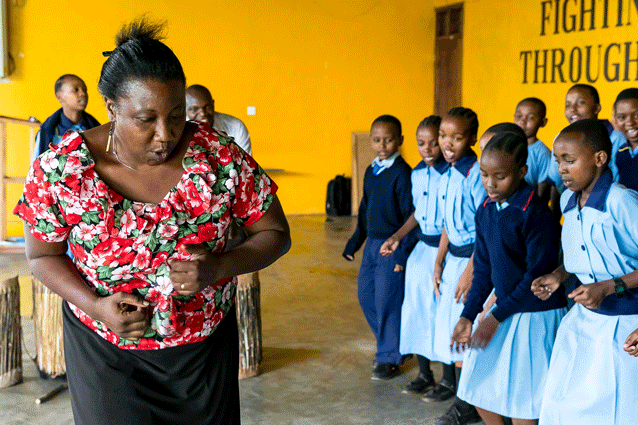
St Jude’s is also helping Eunice grow her own leadership and teaching skills.
The magnificent Mrs Mtili was recently selected by a panel of her peers to participate in a professional development partnership in the United States.
Later this year, she will engage in educational workshops, mentoring and training with teachers from Louisville Collegiate, which has a long running relationship with St Jude's.
Eunice says she is hoping to come back from the States as the best teacher she can possibly be.
“With new skills, new knowledge and better understanding of how children learn, so that I can teach best.”
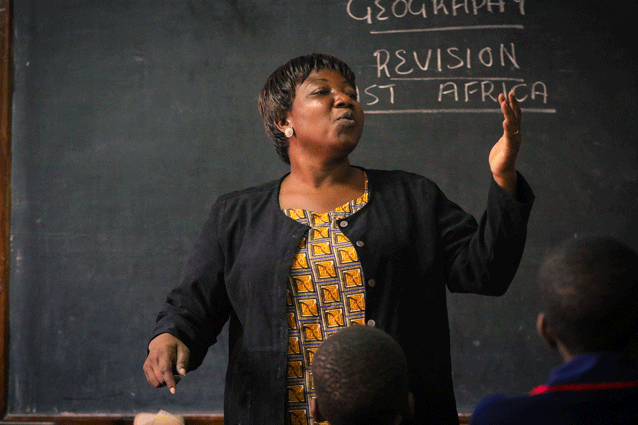
A passion for science is in St Judes' DNA.
Following our three consecutive, successful years competing in the Tanzania Young Scientist (TYS) competition, sponsor and major electricity supplier Songas has awarded St Jude’s a special Passion for Science Award.
“This is a major honour for our school,” St Jude’s Head of Department for Physics and Assistant Academic Master Nzinyangwa Mcharo said.
“For the past six years, St Jude’s has shown its passion for science through the annual Science Day, which brings together young scientists from around the region to work on projects that will solve the problems facing many Tanzanians.
“We are so honoured Songas has recognised our Passion for Science and this award will inspire our students to continue the work they’ve been doing.”
Songas also awarded St Jude’s 2.5million Tanzanian Shillings (Tsh), which was used to purchase two desktop computers.
The awards kept rolling in for 2015 Science Fair winners Venance and Martin, who earned a 400,000Tsh prize from Songas for their Smart House with Raspberry Pi entry.
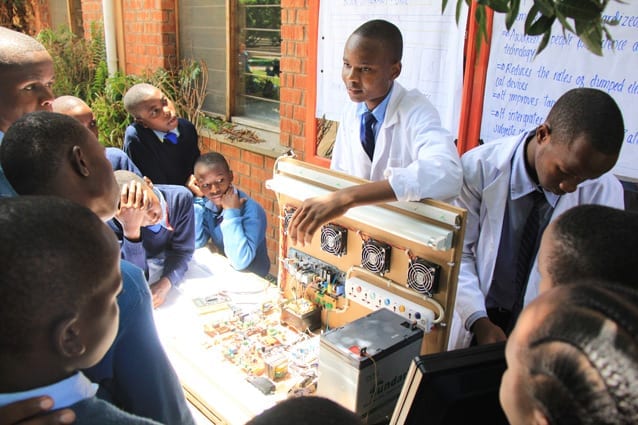
It’s another exciting step for Venance, who has been at St Jude’s since Standard 1 (Grade 1) and always valued his education, using his time to pursue passions for science, computers and engineering.
It’s no wonder he and Martin are good friends, as Martin also began at St Jude’s in Standard 1 and is enthusiastic about engineering and physics.
Having come from homes without plumbing and electricity, both students’ families have also instilled the value of hard work. This, combined with dedication to their high-quality educations, has seen Martin and Venance on track to successful futures.
When their TYS entry took out first place in the Technology category last year, it capped off a great run in national science recognition for St Jude’s. Ntekaniwa and Hashim won a special award for SMS Voting software the year before and in 2013 Liston and Riziki won second prize in the Technology category for their Hybrid Generator.
St Jude’s has emerged as a national leader in science, with last year’s inaugural Form 6 graduates placing in the top 10% of chemistry, physics and advanced mathematics in the national exams.
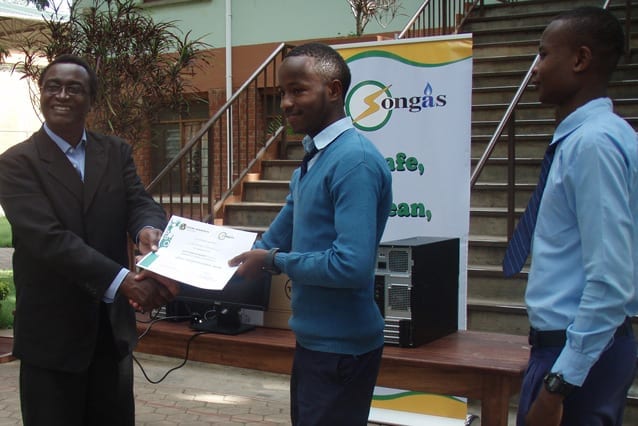
Tanzania Young Scientists’ Dr Goziberth Kamugisha, Songas Ltd representative Dr Mkodo and Songas Community Relations officer Nichodemus Chipakapaka came to our secondary campus in February to personally deliver the special award and speak to students.
Support St Jude’s commitment to academic excellent by donating here, and keep an eye out for more on our 2016 Science Day in late April.
St Jude’s is raising the standard of essay writing in Tanzania, with our students taking out six of the top 10 spots in a recent national competition.
Our talented students placed 1st to 3rd and 5th to 7th at the 2015 annual World Standard Day Essay Competitions ceremony in Dar Es Salaam. The competition is open to all secondary school students, college and higher learning institution students under 35 years and pursuing their studies in Tanzania.
The win is yet another example of how St Jude’s is battling, and winning, Tanzania’s education crisis.
Our students regularly win national and international essay competitions and are consistently ranked in the top 10% in national exams.
The achievement is even more amazing considering our students come from some of the poorest families in Tanzania, where only 7% of people have a secondary education.
Form 5 student Ayubu finished 1st, followed by 2nd-placed Pius (Form 5), 3rd-placed Arnold (Form 6), 5th-placed Denis M (Form 4), 6th-placed Denis T (Form 5) and 7th-placed Damson (Form 5).
Quietly spoken and shy about their achievement, the six students explained how they were able to complete their entries in just “a couple of weeks” after the competition theme was changed last-minute.
“Our essays were all about Standards: The World’s Common Language,” Denis T said.
The six students were proudly acknowledged and cheered during an afternoon assembly upon their return from the three-day trip to Dar, where they were accompanied by teacher Lightness Isojick. The top three were presented with high-tech rewards - Ayubu with a tablet for his efforts, Pius a laptop and Arnold a smart phone.
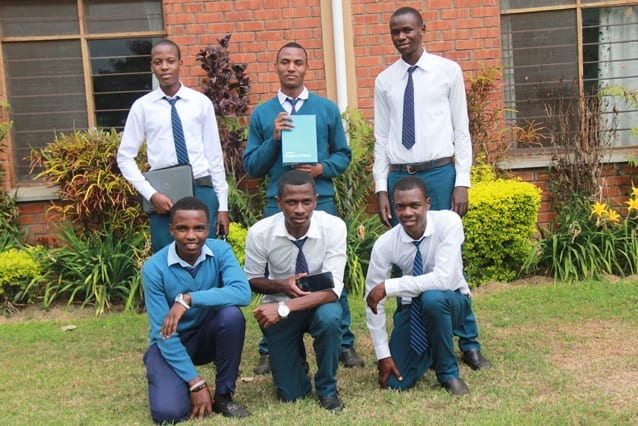
Lightness, who often coordinates academic competition entries for St Jude’s, was very proud of how they performed.
“(The students) have done so well. Everyone wanted to know the secret behind our victory,” she said.
Lightness responded by reminding people of St Jude’s track record in the annual competition – six top 10 students in 2012 (including Denis T, who came second) and three last year (including Pius).
She said it would not have been possible without the support from school management, and so many individuals who can “share our students’ victory, and that is the best reward we could get”.
Help us create the next generation of Tanzanian leaders. Donate to The School of St Jude.
Our Standard 7s have been put to the test and aced it!
From more than 16,000 schools in the country, our 135 final-year primary students placed in the top 2% for national exams, and we could not be more proud.
“The results are really wonderful, with 68 students achieving A’s and 67 achieving B’s,” upper primary headmaster Peter Manjalla said.
St Jude’s provides scholarships to students from the poorest homes in Tanzania, helping families who would not be able to send their children to school.
Since opening with just three students in 2003, the school has grown to offer almost 2000 scholarships and consistently ranks as one of the top schools in Tanzania.
Our commitment to world-class teaching standards paid dividends in May when our first ever Form 6 (final year of high school) graduates finished in the top 10% in Tanzania.
These students, who come from impoverished families, will now have an opportunity to go to university and develop into future leaders in their communities.
Help St Jude's produce future leaders in Tanzania by becoming a sponsor today.
Debate about the most hotly-contended presidential election in Tanzania’s history didn’t just come from those old enough to vote.
Our Upper Primary English department hosted the final of its three annual school debates, with the rousing subject of ‘Who Would Make the Best Tanzanian President?’.
The debate prompted students to educate themselves on Tanzanian politics and reflect on national policy and the qualities of good leadership.
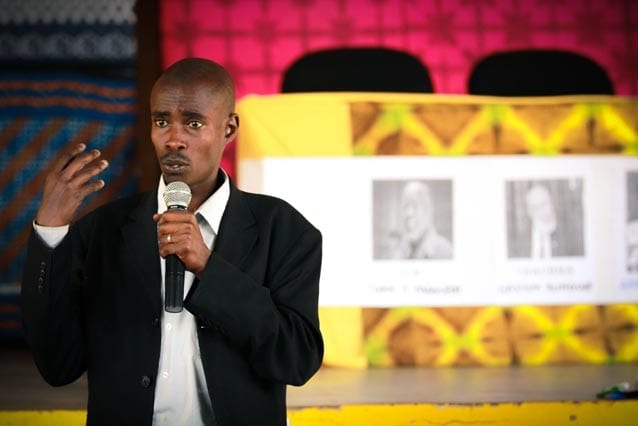
In a country that has been ruled by the CCM party for the past 54 years, rival CHADEMA has proven to be a rare, worthy opponent to contest the current Government.
/Hands held high, in either the form of a ‘peace’ sign for CHADEMA or a ‘thumbs up’ for CCM, the school audience was quick to show their support to the 20 or so students arguing their cases on stage.
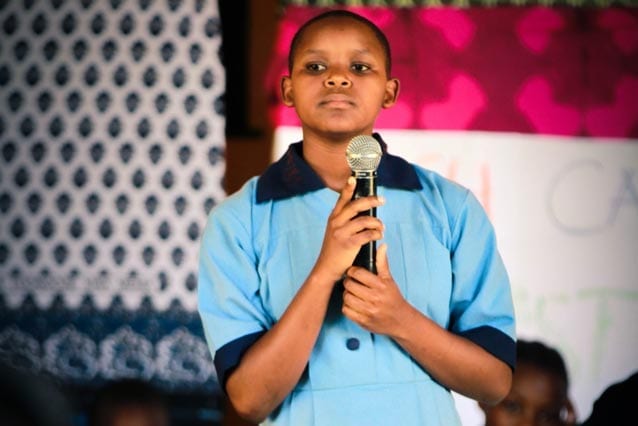
CHADEMA’s popularity rose to great heights in the area around St Jude’s recently, as their leader is a former Prime Minister and CCM member who hails from the Monduli region of the Arusha district.
This popularity was reflected in the debate, which focused primarily on CCM leader John Magafuli and CHADEMA leader Edward Lowassa.
Senior primary principal Peter Manjella said the English department encouraged students to focus on the qualities they wanted in a leader. Edmund Mutajuka, English Department head and organizer of the debate, has also been leading students in practicing their public speaking).
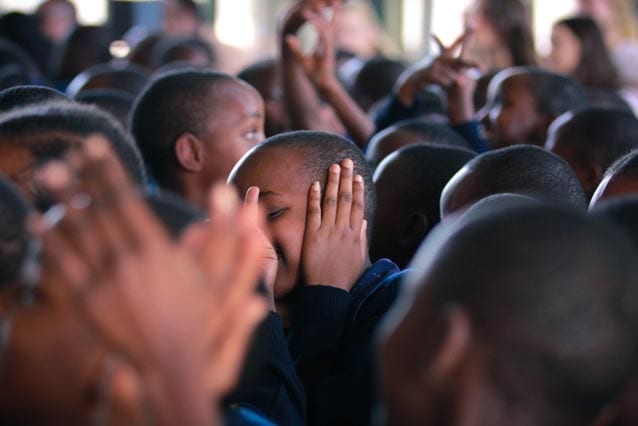
The hour-long debate was critiqued by students and teachers alike, with the event more a chance to air opinions than decide on a winner.
Meanwhile, eight of our Form 6 graduates showed their community leadership by working at polling stations during the general election. We’re proud of Alfani, Judica, Justin, Negi, Elizabeth, Hosiana, Erick and Mrema doing their bit to facilitate voting!
Peter, who passed on the news, said he was thoroughly impressed.
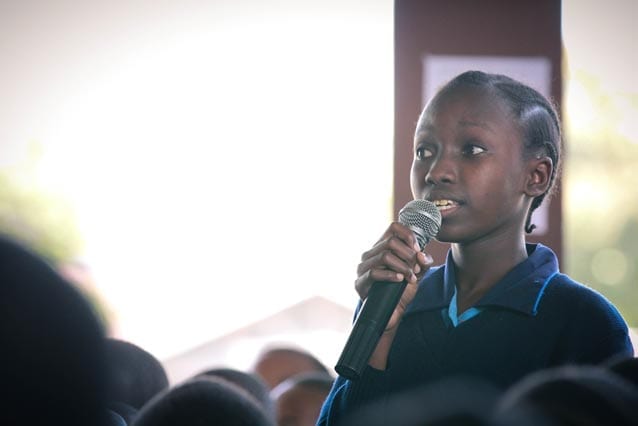
“This is really leadership, these positions were really competitive,” he said.
“More than 6000 people applied for the 2860 positions, but they made it.”
Tanzania's governing CCM party candidate Magufuli won the presidential election with 58% of the vote, the electoral commission said on October 29.
Support a rising leader today and sponsor one of our politically-engaged students.